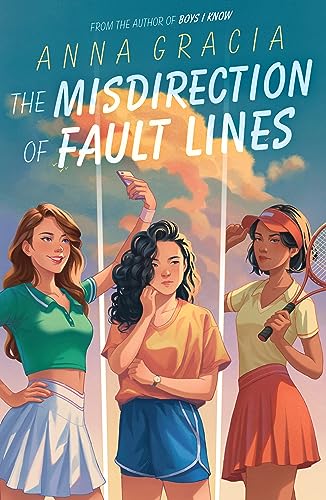
On April 2, 2024, Anna Gracia released her third book, “The Misdirection of Fault Lines.” Like her previous novels, Gracia highlights heavy topics that surround many teenagers in her story.
“The Misdirection of Fault Lines” follows Alice Wu, Violetta Masuda and Leylah Lê, three Asian-American high school girls. They end up as roommates who are competing in the prestigious Bastille Invitational Tennis Tournament, which will determine their future and the next steps they want to take in life. Despite being a sports novel, the book focuses more on the characters’ off-the-court lives, relationships and challenges, in addition to their resilience with breaking stereotypes.
Told from three first-person points of view, the first main character introduced is Alice, who has a quieter and more reserved personality. She arrives at the competition still dealing with her father’s recent passing, who was also her coach. Because of her family’s financial struggles, Alice is guilty about attending Bastille and not sure how to keep moving forward with her sport.
“There is no joy to be found on this court. I am out here only because I have nowhere else to go,” Alice thinks.
Violetta, however, is a tennis influencer, but she has to constantly live up to her mother’s expectations of what she once wanted for herself. Even though she is well-connected with every advantage available for her, Violetta suffers from addiction, eating disorders and an inappropriate relationship with an adult. Because of all the added stress she receives, and her busy schedule, she starts to dislike tennis.
“Practice always looms in the back of our minds, threatening its comeback after only a day or two of rest,” Violetta thinks.
Leylah used to be best friends with Violetta, but after a falling out with her two years ago, she left tennis but decides to compete in her first competition since then. Out of the three main characters, she is the most passionate about the sport. Leylah wants to go pro, but she, like many readers, struggles with convincing her parents to support her, so the competition is her way to prove her skill and passion for tennis to them.
“If both Mom and Dad are waiting for me, I get the all-you-can-eat immigrant-struggle buffet. Endless reminders about how they had it much worse and this means I must be grateful about everything until the end of time,” Leylah thinks.
Because of the multiple points of views this book is told in, Gracia does not shy away from highlighting each individuals’ flaws. Alice is portrayed as a quiet, mousy character with no backbone. Violetta is seen as vapid and a little self centered by Leylah, but Alice idolizes Violetta for taking her under her wing. Leylah comes off as stubborn and irrational, despite the fact that she is just very passionate about feminism and countering stereotypes. Each character is relatable in their own way, with their flaws, strengths and overall improvement.
As the story progresses, Alice, Violetta and Leylah overcome their challenges and grow as individuals. They are able to look back at their actions and change the way they behave. Their relationships with their families and other competitors improve, as they also build unbreakable bonds with each other over the course of the tournament.
“Liberty. Equality. And a fraternity of sisters, forever bound together by these past eleven days,” Alice thinks.
“The Misdirection of Fault Lines” only continues to prove that Gracia is able to handle uncomfortable topics without glossing over them. Despite the flaws in her characters and the challenges they face, she does not romanticize them. Instead, she uses them to bring importance to their development and growth as individuals, making this novel a worthy read for any young adult.

